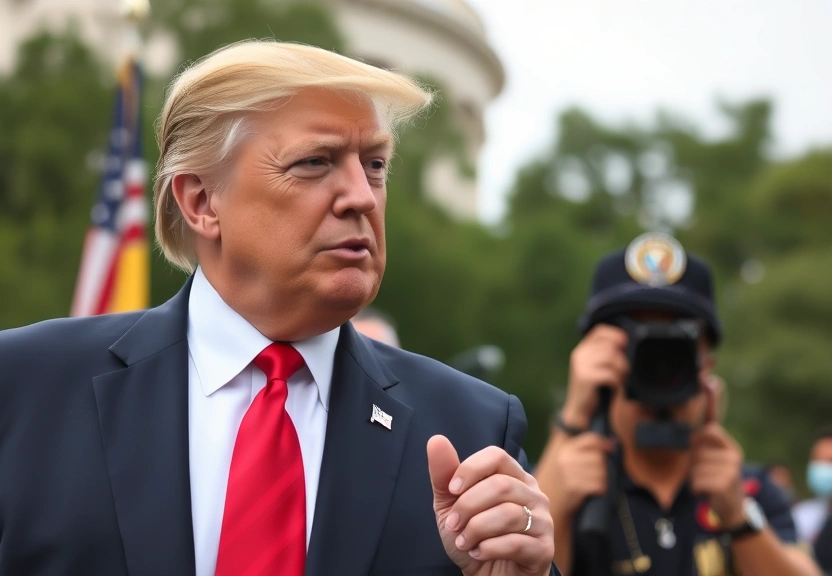Trump Signals Support for Arresting California Governor Newsom Amid Protests

Trump Signals Support for Arresting California Governor Newsom Amid Protests
In a controversial statement, U.S. President Donald Trump recently indicated his support for the potential arrest of California Governor Gavin Newsom, amidst escalating pro-immigration protests throughout the state. These protests have drawn significant attention, highlighting the ongoing tensions surrounding immigration policy in the United States. As protests erupted, President Trump took the drastic step of deploying the National Guard to maintain order, stirring up a firestorm of political discourse.

The implications of Trump’s comments about Newsom’s possible arrest cannot be understated. They not only reflect the current political climate but also underscore the broader issues of governance, law enforcement, and public safety during a time of social unrest. This article delves into the circumstances surrounding Trump’s remarks, the protests in California, and the implications of deploying the National Guard.
Background: The Protests in California
California has long been a focal point for immigration-related issues in the United States. The state is home to a significant immigrant population, which has led to debates about the appropriate approaches to immigration enforcement and sanctuary policies. Recently, protests advocating for immigrant rights have gained momentum, fueled by dissatisfaction with both state and federal policies.
Historical Context of Immigration Protests
Protests in California are not a new phenomenon. Over the years, various movements have emerged, advocating for the rights of immigrants and challenging restrictive immigration policies. These protests often serve as a platform for communities to voice their grievances and demand changes in legislation. In light of the current political climate, the recent protests have become more intensified, drawing both supporters and opponents into the fray.
Trump’s Remarks and Their Implications
President Trump’s suggestion regarding the arrest of Governor Newsom is emblematic of the broader tensions between state and federal authorities, especially regarding immigration. Trump’s comments raise significant questions about the legality and morality of such actions, as well as the potential fallout for both the governor and the state of California.
Legal Considerations
The idea of arresting a sitting governor poses complex legal challenges. In the United States, governors hold a significant degree of power within their states, and any action to arrest them would typically require a legal basis. This raises questions about the separation of powers and whether the federal government can indeed intervene in state matters.
Deployment of the National Guard
In response to the protests, President Trump ordered the deployment of the National Guard to California. This decision has sparked widespread debate regarding the appropriateness of military involvement in civilian protests and the potential for escalating tensions between law enforcement and protesters.
Role of the National Guard in Civil Unrest
The National Guard has often been deployed during times of civil unrest to help restore order. However, their involvement can also exacerbate tensions and lead to confrontations with protesters. The goal of deploying the National Guard is typically to ensure public safety, but the effectiveness of this approach can be contentious.
Political Reactions and Public Sentiment
The political landscape surrounding Trump’s remarks and the National Guard’s deployment is highly polarized. Supporters of President Trump may view the actions as necessary to combat perceived lawlessness, while opponents argue that it reflects an overreach of federal power into state governance.
Public Opinion on Immigration Policies
Public sentiment regarding immigration policies remains divided. Many Californians support more lenient immigration practices, advocating for the rights of undocumented immigrants, while others call for stricter enforcement. The protests reflect these divisions and have drawn a wide range of responses from local and national leaders.
Important Points to Consider
- The complexity of legal ramifications surrounding the potential arrest of a sitting governor.
- The historical context of immigration protests in California.
- The role and effectiveness of the National Guard in managing civil unrest.
- The polarized political landscape and its impact on public sentiment regarding immigration.
- The broader implications for state-federal relations in the context of immigration enforcement.
Frequently Asked Questions (FAQ)
1. Why did President Trump suggest the arrest of Governor Newsom?
Trump’s suggestion came in response to the pro-immigration protests in California, indicating his frustration with the state’s stance on immigration policies.
2. What are the legal implications of arresting a sitting governor?
Arresting a sitting governor raises significant legal questions regarding state sovereignty, the separation of powers, and the jurisdiction of federal law enforcement.
3. How has the National Guard been involved in civil protests historically?
The National Guard has been deployed in various instances of civil unrest to help maintain order, but their presence can often lead to increased tension between protesters and law enforcement.
4. What are the key issues surrounding immigration policy in California?
Key issues include sanctuary laws, the treatment of undocumented immigrants, and differing state and federal enforcement policies.
5. How do the protests reflect public sentiment on immigration?
The protests illustrate a significant divide in public opinion, with many advocating for immigrant rights while others call for stricter immigration enforcement measures.
Conclusion
President Trump’s comments regarding the potential arrest of Governor Gavin Newsom amidst the backdrop of pro-immigration protests highlight the complex interplay between state governance, federal authority, and public sentiment on immigration issues. The deployment of the National Guard adds another layer of complexity to the situation, raising critical questions about the effectiveness and appropriateness of military involvement in civilian matters. As the situation continues to unfold, it is clear that the political and social ramifications will resonate far beyond California, impacting national discourse on immigration policy and governance.
📰 Original Source
Este artigo foi baseado em informações de: https://www.reuters.com/world/us/trump-hints-he-would-support-arrest-california-governor-newsom-2025-06-09/




